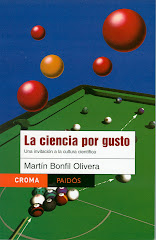Published in Milenio Diario, May 27, 2009
 The great trust we have in science and in the knowledge it produces is based, mostly, in its rigorous quality control system.
The great trust we have in science and in the knowledge it produces is based, mostly, in its rigorous quality control system.
For something to be considered valid in science, its not enough that somebody with a pHD says it, . The work of a researcher, including a detailed description of his records, methods, an analysis of the results and the arguments that support the conclusions, have to be socialized in seminars and conferences and accepted by the community of experts to which he belongs.
The process ends with the publication of the work in an international refereed journal. These journals only accept works that have gone through a thoroughly process of "peer review", generally anonymous, in which is frequent to ask for changes or additions based on the expertise of the referees.
Hence the little scandal that erupted when The scientist magazine (April 30) published that pharmaceutical company Merck, Sharp & Dohme had negotiated with Elsevier, the most famous and powerful scientific magazine publisher in the world, the publication, between 2003 and 2004, of a scientific magazine made by order with summaries and review articles published in other magazines which results were always favorable to Merck products.
The pharmaceutical industry is one of those dangerous places where the border between science and business is blurred. It's not wrong for a company to publicize its products. Informal magazines that are given to medical doctors and summarize information of arbitrary magazines are common practice. But it is always clear that these are not true scientific magazines, but instances of propaganda.
The alarming thing about this case is that Merck's "infomercials" were disguised as good science. And worst: in view of the scandal, Elsevier revealed that it had made not only one, but six magazines paid for by companies. They stopped doing this years ago, but the moral of the story is clear: the greed of publicists and companies can put the quality and the reliability of science at risk.
As it also occurs in democracy, transparency, far from debilitating science, makes it stronger. Let's hope Elsevier learned their lesson.
(translated by Adrián Robles Benavides) To receive Science for pleasure weekly
in your email, subscribe here!




No comments:
Post a Comment